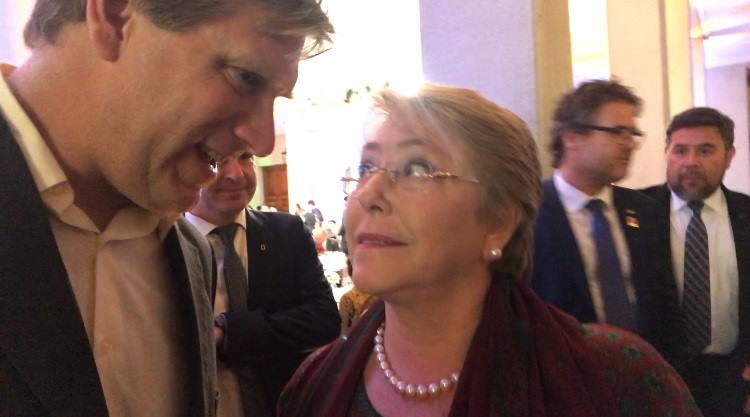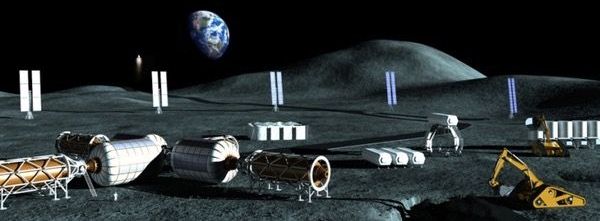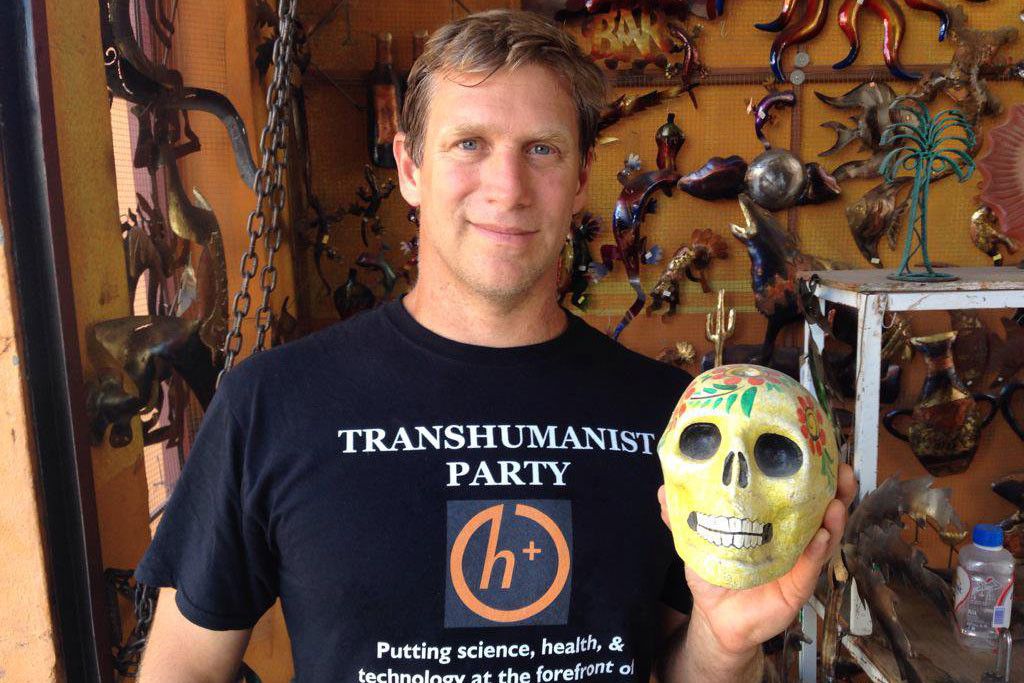We talked a bit, and I had dinner at the presidential palace. Here’s a quick snapshot I got of us chatting! There are some professional pictures coming too. #transhumanism



My article with Jeff Sommers (see “The emerging field of space economics: theoretical and practical considerations”, The Space Review, December 18, 2017) raised considerable criticism regarding the Moon Treaty, particularly, the inclusion of the Common Heritage of Mankind (CHM) doctrine. Leigh Ratiner, L5 attorney during the 1980 Senate ratification hearings, had identified CHM as the reason for rejecting ratification:

Titles are chosen by editors and not journalists or experts. I fought my editor over the above title. Yes, I address the teaser—and I explain a solid altcoin investment model. But, that comes after the break. The first part of this article should be titled “Why would anyone quote cost or value in Bitcoin?”. The subjects are highly related, so bear with me…
Today, a reader asked this question:
Some financial sites discuss value in Bitcoin terms, rather
than dollars or Euros. Why would I calculate the value of a
new car, my rent or an investment in this way? It’s hard to
understand how much money I need!
Answer: Your right! It’s difficult to estimate the value of a car or your rent in terms of Bitcoin. You are paid in dollars or Euros—and your landlord quotes rent in the same currency.
On the other hand, it’s natural to gauge the value of something by comparing it to a commodity that you earn and spend at a steady or predictable rate. Therefore, your assumption that it makes more sense to determine value on a dollar-basis is absolutely correct. No one determines the value of a new car by comparing the cost with a government’s national debt—or the number of donuts you would need to sell (unless you are a donut maker).
But, this assumption is transitory. It is based on a historical paradigm that is gradually changing. We are entering a bold new era. A big debate is shaping up over How gradual is the change? But make no mistake: This change is occurring in our lifetimes…
That change will eventually lead you to estimate, earn, spend and value things in Bitcoin or a similar cryptocurrency. One day soon, fluctuations in the value of the US dollar or Euro will cause you to wonder “What is happening with the dollar?” rather than shake your confidence in Bitcoin. Bitcoin (or something similar) will integrate into your mindset as the exchange medium, rather than fiat currency of a nation state.
Naturally, a series of dominos must fall, before you realize that Bitcoin is the money. I predicted this four years ago, and the process is already occurring. It is retarded by two unfortunate events, but these are both temporary setbacks:
Both of these problems have solutions, and we have already seen the solutions at work in altcoins. Think of forks and altcoins as beta tests…Bitcoin will fold in the best of these technical improvements and will very likely continue to inch toward becoming the world’s de facto currency.
Revenue Neutral Investing
To answer the question in the title, let’s look at this from a completely different angle. The individual who asked the original question went on to ask this:
Cryptocurrency sites compare and track the cost of altcoins in
terms of Bitcoin rather than dollars. What’s with that?! Do they
assume that we will all be selling Bitcoin to buy the new altcoin?
It actually makes sense to value altcoins in terms of Bitcoin—even today. How so?…
This growing trend provides very useful information. This method of quotation helps the reader to determine the relative change in value between the two currencies and compare it to fundamentals that they learn from news and research. The information can then be used to hedge an investment or even craft a revenue-neutral investment strategy. Allow me to explain…
I am long on Bitcoin. This is not likely to change. So I keep a significant fraction of my wealth in this form.
But, I also understand that the use and market for cryptocurrencies is young and very immature. A very few other forks and altcoins are the real deal. They have solved some major technical flaws with Bitcoin and they have the potential to become a credible, functional currency. This isn’t the place to explain my favorite coins, but the strategy is relevant.
Since I already have a substantial position in Bitcoin, I wish to avoid further exposure in the market. Therefore, I invest long and short at the same time (for example, using puts and calls)* on certain coins that are likely to perform better than other coins. This reduces risk, by leaving me without a loss, if the entire market rises or falls. The only way I might lose is if I get it exactly wrong! That is, if the coins that I believe are scams do better than the ones that I feel are well-designed and with a solid adoption trend. (Remember: The risk reduction strategy is to invest on the difference between an overvalued dog and an under-performing beauty).
To avoid the downside scenario (i.e. getting it exactly wrong), focus on fundamentals and not the cost of a unit, short term trends, emotional zeal, or other technical issues. Don’t follow the crowd! Bet on value and bet against hype. (TIP: The take-away, here, is to do both at once!). Investors who consider only asset cost and trends are in a craps shoot. The smart money determines which coins are likely to be a better functional instrument than other coins and then sticks with a dollar cost averaging plan for months at a time.
Want to learn more? Want to know which coins I admire? Reach out. Let’s talk. I don’t bite.
* A regulated financial exchange for puts and calls does not exist for altcoins. But, with a little research, you can create an nearly equivalent futures contract or options instrument. You may need to be a bit creative.
Philip Raymond co-chairs CRYPSA, publishes A Wild Duck, hosts the Bitcoin Event and kicked off the Cryptocurrency Expo in Dubai. Click Here to inquire about a live presentation or consulting engagement.

A new story on my work out from Bodyhacks. (Please remember I don’t write these stories nor pick the photos, but I’m honored people I don’t know choose to cover my work and #libertairan governor campaign however they wish): http://bodyhacks.com/zoltan-istvan-libertarian-transhumanist…alifornia/ #transhumanism
On the 2018 California ballot, the good people of California will have a chance to vote not only for a candidate who stands for a unique political agenda but one who stands for an equally unique non-political ideology. Zoltan Istvan [real name] will run on the Libertarian party’s platform, but with a transhumanist agenda.
He’s not the first transhumanist to run. In Australia, Meow Meow Ludo Disco Gamma [also real name] ran for office on a science platform last year, but that was way down under. This is ‘Merica, and it’s not the first time Istvan has run either. He put his name in the hat with Hilary and Donald in the last presidential election. [Psst, he didn’t win.]
Zoltan is not only a transhumanist in philosophy, he’s a practicing preacher. He even wrote a best-selling book, The Transhumanist Wager, to back up his beliefs.
Istvan believes humanity stands on the precipice of transhumanism as a normal state of affairs. Technology, he sees as a way to level the playing field of inequality. But, does anyone take him seriously?
Some anniversary info from the Transhumanist Party, which I founded a few years back. This growing political party—under new leadership now—continues to prove important and inspiring. Congratulations to all those who have helped it forward! http://transhumanist-party.org/2017/11/25/ustp-chairman-anniversary/ #transhumanism
Gennady Stolyarov II
On November 17, 2016, I became the Chairman of the United States Transhumanist Party. It was a turbulent era in American politics, although it now appears to me to have been a distinct prior epoch. The offer of Chairmanship from Zoltan Istvan came at exactly the right time. I was seriously considering emigrating from the United States, which would have been a mistake. For this role, however, an expatriate Chairman would not do; Zoltan asked me to remain for at least six months – hopefully a year – and then re-assess the situation. One does not get handed leadership of a political party often (or virtually ever), so this was a unique opportunity to make a difference in American politics in a constructive way, with instant gains in prominence, and without the distasteful maneuvering that many conventional political figures feel compelled to engage in to attain a comparable position.
It has been a year, and I am staying. I have indeed reassessed the situation, or perhaps the situation has been transformed so considerably than the already transitional interpretive framework of late 2016 can no longer adequately describe our present political reality. Whereas then the tumult seemed to have stemmed from a single source, we now inhabit a distinctly different sort of chaotic era, in which the chaos emanates from virtually all partisan factions espousing conventional political ideologies. The United States has not, despite my fears at the time, succumbed to dictatorship or totalitarianism – and, despite some ill-advised policy decisions and unfortunate increases in certain forms of intolerance and hatred (on both the right and the left), there are no waves of nativist “ethnic cleansing”; there are, thankfully and for now, no massive riots in the vast majority of cities, the vast majority of the time.
Most people probably aren’t aware of this, but the 2016 U.S. Presidential election included a candidate who had a radio-frequency identification chip implanted in his hand. No, it wasn’t Donald J. Trump. It was Zoltan Istvan, a nominee representing the Silicon Valley-based Transhumanist Party and his body-worn chip unlocked his front door, provided computer password access and sent an auto-text that said: “Win in 2016!”
The transhumanist movement – employing technology and radical science to modify humans – offers a glimpse into the marriage of machines and people, the focus of a recent paper released by the Institute for Critical Infrastructure Technology (ICIT). With cybernetic implants already available to consumers, the prospect for techno-human transmutation – cyborgs – is not as far away as many may think.
“We are moving towards automation, we are moving towards machine learning,” said Parham Eftekhari (pictured), co-founder and senior fellow at ICIT. “We’re seeing it impact a lot of our society.”
Eftekhari stopped by the set of theCUBE, SiliconANGLE’s mobile livestreaming studio, and spoke with co-hosts John Furrier (@furrier) and Dave Vellante (@dvellante) at CyberConnect 2017 in New York City. They discussed ICIT’s recent cybersecurity research and the potential for increased government regulation. ( Disclosure below.)
The Government of Dubai Media Office via the United Arab Emirates Prime Minister’s official YouTube channel has released a 3-minute video of the World Economic Forum Global Future Councils 2017 meeting. My speech on the main stage at the event is covered a number of times in the middle of this video as I discuss #transhumanism and human enhancement. I was honored to have founder and Executive Chairman of the World Economic Forum Klaus Schwab and the Prime Minister of UAE, HH Sheikh Mohammed Bin Rashid Al Maktoum, listen to some of my talk. The Global Futures Council event was a big success and a lot of fun: #gfc17
http://fw.to/ilMs6BD
11 November, 2017 — Vice President, Prime Minister of the UAE and Ruler of Dubai His Highness Sheikh Mohammed bin Rashid Al Maktoum has attended part of the 2nd Annual Meeting of the Global Future Councils (AMGFC) organised in partnership between the UAE Government and the World Economic Forum (WEF) – Davos. During a meeting with the Founder and Executive Chairman of the World Economic Forum Professor Klaus Schwab, His Highness Sheikh Mohammed asserted that the United Arab Emirates is keen on adopting the future industry by utilising the Fourth Industrial Revolution technologies to benefit societies.
http://fw.to/OxpyTgG
11 نوفمبر, 2017 — شهد صاحب السمو الشيخ محمد بن راشد آل مكتوم، نائب رئيس الدولة رئيس مجلس الوزراء حاكم دبي “رعاه الله”، ظهر اليوم، جانبا من فعاليات وأعمال الدورة الثانية لاجتماعات مجالس المستقبل العالمية التي تنظمها حكومة دولة الإمارات بالشراكة مع المنتدى الاقتصادي العالمي “دافوس”، والتقى سموه عددا من المشاركين في الاجتماعات. وأكد سموه لدى لقائه البروفيسور كلاوس شواب رئيس ومؤسس المنتدى الاقتصادي العالمي، أن دولة الإمارات تتبنى صناعة المستقبل وتطوير نماذج عمل تتلاءم مع متطلباته وتوظف تقنيات الثورة الصناعية الرابعة بالشكل الأمثل الذي يدعم الارتقاء بحياة المجتمعات والشعوب.
Ozone is a colorless combination of three oxygen atoms. High in the atmosphere, about 7 to 25 miles above the Earth, ozone shields Earth from ultraviolet rays that cause skin cancer, crop damage and other problems.
Scientists at the United Nation a few years ago determined that without the 1987 treaty there would have been an extra 2 million skin cancer cases by 2030. They said overall the ozone layer is beginning to recover because of the phase-out of chemicals used in refrigerants and aerosol cans.
How many individuals own at least 1 BTC?
I was asked this question today at Quora, a popular Q&A blog covering a variety of technical and economic disciplines. Under my alias “Ellery”, I am the most viewed author on Bitcoin and the blockchain.
While this question may sound like a good factoid for a trivia game, it is directly related to something with with far reaching impact on your pocketbook and your future. It goes to the heart of a debate between warring factions: In the 2nd half of this answer, I address the eternal question:
Is Bitcoin a pyramid scheme? Or are we still early on the adoption curve?
But let’s start with the question at hand…
There is no certain answer to the number of people who own Bitcoin or how many own more than 1 BTC. We know that tens of millions of wallets have been created, but this certainly doesn’t help. Although the value of every single wallet is publicly disclosed on the blockchain (most have a zero balance), there is no way to determine who owns each wallet. Some may be controlled by organizations or custodians on behalf of many individuals, while others may be just one of many wallets with a single owner.
Most of my Bitcoin is in a wallet or a vault hosted by Coinbase, the San Francisco exchange. When I log into my account to view my wallet ID, I see that I have dozens of wallets—all valid. The large number of wallets is not related to my wealth. Rather, it a byproduct of my many small transactions. Coinbase creates a new wallet each time that I buy, sell, or purchase something with my BTC. There are good reasons for this practice, but it certainly muddies the correlation between wallets and number of owners.
There are 16.6 million coins in circulation today (a bit less, since some have been irretrievably lost). That puts a cap answering the question. There cannot be more than this many people with a full BTC—currently worth about USD $5900.
But, we know that the number of individuals with a full coin is considerably less. After all, many people in my own circles own dozens of coins, and Satoshi is very likely to hold 1 million BTC. Coinbase and Bitstamp are just two of very many custodial exchanges (i.e. they offer a cloud wallet or vault service to their clients). They host many hundreds of wallets with more than 50 coins. In almost each case, the client has provided single-user taxpayer information to these services, and so it is very unlikely that a significant fraction of these wallets belong to more than a single person or family.
And, let’s not forget that a far greater fraction of exchanges fly under the covers. That is, they don’t collect taxpayer information or report the wallets that they administer to any authority—nor to analysts or journalists like me.
So, while no one can accurately estimate the number of individuals who own 1 or more BTC, the answer is very likely under 2.5 million, worldwide. 1
The number of people who have heard of Bitcoin is growing rapidly. In the United States, fewer than one in twenty people were aware of Bitcoin just 2½ years ago (at the beginning of 2015). By September 2017, almost one in four USA adults a reasonable idea what it is—and most of them could debate their position on its future. 2
There will never be more than 21 million bitcoin. This is the mathematical upper limit. Compare this with the current US population of 323 million. So even if all Bitcoin owners were in America (they are not!) and if no one owned more than 1 BTC, fewer than 1 in 19 Americans could own a full Bitcoin today and fewer than 1 in 15 after all bitcoin are mined.
If we consider the global population of 7.6 billion, fewer than 1 in 458 people could own a full Bitcoin today. Since most early adopters have more than 1 BTC, the actual fraction is probably much smaller than 1 in 25,000 individuals.
In the introduction, above, I said that the question about how many people own more than 1 BTC leads to a more profound question. In fact, this innocent trivia question, leads to insight about adoption and the economics of investing in a deflationary instrument as it spreads throughout commerce, investors and all sorts of institutions.
Moral of the story…
The original question asks for a simple number. It doesn’t ask for editorial perspective. But it’s tough to resist. With fewer than 1 in 25 thousand people owning a bitcoin, a reasonable question is:
Will adoption increase, even if interest is limited to only one sector?
For example, what if Bitcoin falters in all but one of these venues: Bleeding edge geeks, collectors, investors, p2p payments, interbank transfer, debt settlement, or treatment in some regions as a currency.
Answer: Even if Bitcoin continues to show strength in just one of these areas, it will eventually be used or accumulated by millions of new users—even if they don’t realize it!
Do you see where I am going with this? Even if you believe that Bitcoin will…
Even if you believe in all of these limiting factors, the overall demand for Bitcoin has barely begun. We have not even started climbing the hockey-stick curve toward limited adoption as an occasional, alternative payment mechanism.
At conferences and in my own classroom, I am often asked: Should I still acquire Bitcoin? —Or is it too late? After all, it has risen from a fraction of a penny to $6,000 in just a 7 years. And from under $1000 to $6,000 this year alone!
I am not a financial advisor. I often speculate, but never offer guidance. I embrace the wisdom that past performance is never an assurance of future gains. But, I ask students to look at the assumptions and at the math: Unlike US dollars, shares in Apple, pork bellies or gold pressed latinum, Bitcoin is firmly capped. There will never be more than a paltry 21 million coins. That means that each coin absolutely, positively must increase in value with even a modest adoption scenario.
The Argument Against Bitcoin
Bitcoin is a pure supply-demand commodity. Since the supply is fixed and well understood, the only argument against acquiring Bitcoin arises from a belief that demand will dwindle. This is the argument of someone who believes that Bitcoin will fail to gain any further traction in any sector.
Perhaps you believe that something else will displace it, or that governments will find a way to effectively defeat it. If you have been reading my Blog (or my Quora answers) for more than a few months, then you already know that neither scenario is realistic.
I believe that investment in Bitcoin a speculative asset retards adoption. I defend this opinion in many interviews and articles. Although I hope for fewer speculators and more ‘legitimate’ users, I own an outsize share of the world’s future value store, transfer media and fungible, liquid asset. I am guilty of the speculation that I seek to deter.
1 & 2 CRYPSA Research, Feb 2015 and Oct 2017, Cryptocurrency Standards Association. Polls conducted at Rein’s New York Deli in Vernon CT and Spectrum Center, Irvine CA.
Philip Raymond co-chairs CRYPSA, publishes Wild Duck and hosts the New York Bitcoin Event. He is on the New Money Systems board and kicks off Cryptocurrency Expo in Dubai. He frequently consults and presents.

I did a new interview on #transhumanism for some journalism students at Germany’s Technical University of Dortmund. It’s in English:
Mechanical bodyparts are very common nowadays – a lot of humans have a hip replacement or a pacemaker. Technology helps saving our lives rather often. Some people want to take this a lot further – a philosophical and scientific movement called Transhumanism. Zoltan Istvan Gyurko is one of the most famous Transhumanists, he even ran for president in 2016. In this interview, he talks about his first experiences with Transhumanism, immortality and the future of humanity.
By Marie-Louise Timcke und Paul Klur
Why is Transhumanism important for our society nowadays?
Zoltan Istvan: Well, Transhumanism is perhaps the most important subject matter that we have actually existing in society at the moment. Because humankind has been moving forward very slowly developing science and technology. But in ways that haven’t really rudimentary changed the human being. But all of a sudden, since the invention of the microchip, humanity is changing dramatically because of data, because of the internet, because of computers, because of smartphones. And what we have seen is almost nothing compared to what we’re going to see over the next ten or twenty years. Transhumanism is the field that wants to use science and technology to modify the human being and realise this kind of digitization of the actual self. But most importantly, the next ten years are going to be completely disruptive to whatever we thought it meant to be human beings.